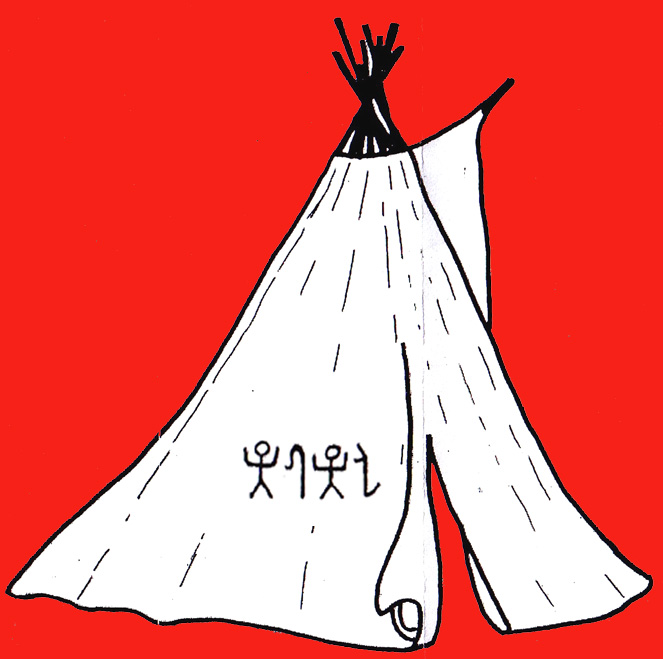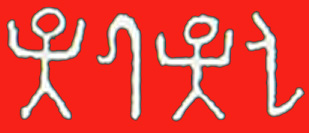
Iowa You make me smile

 |
Iowa You make me smile |
 |
| In doing some research on the name IOWA, a person cannot help but notice its similarity to the sacred name of the Creator, please let me explain. Even to this day the Cherokee call the Creator Yowa. Noah Webster stated that the "letter i . . . seems to have had the sound of y in many words as it still has in the German." 1828 American Dictionary [under J] Lewis and Clark's map of 1814 refer to the Iowa river, spelling it Ioua, which is exactly as the island of Iona was spelled in the oldest manuscripts. "The oldest form of the name in the MSS. is Ioua, used as an adjective agreeing with insula." Folk Etymology by A. Smythe Palmer p. 537 Columba, or Columkille, as his own people often referred to him, established the headquarters of Iona. Columkille was the successor of Patrick. These two prominent figures have now been sainted by the Catholic church. They had to do this, because the common people regarded them so highly, but the truth is that Columba and Patrick were not Catholics, as a matter of fact they contended against Catholicism. The last hours of Columba are recorded as follows: "Having continued his labours in Scotland thirty four years, he clearly and openly foretold his death and on Saturday (7th day), the ninth of June, said to his disciple Diermit: 'This day is called the Sabbath, that is, the day of rest, and such will it truly be to me; for it will put an end to my labors'." Truth Triumphant p. 108 Notice Columba kept the Scriptural Sabbath, and not Sunday, Rome's day. Iona was the great Sabbitarian center, the high tower, or defense from Catholicism, where the righteous could run to and be safe from persecution. It was called "the government of Ia." J. O'Donovan, The Annals of Ireland, Three Fragments, Fragment: II, year 704. Quoted in The Celtic Church in Britain p. 26, 91 by Leslie Hardinge This supports the idea that the island of "Ioua" being named after the Creator, Who worked through this place to make His truth known. Ioua was literally a form of the sacred name that was used in history, please notice the following quote from the Oxford English Dictionary (under Jehovah). The sentence is in Latin , and reads: "Non enim he quatuor liter si ut punctate sunti, legantur, Ioua reddunt: sed (ut ipse optime nosti) Iehoua efficiunt]." by Peter Galatinus 1516. The sentence basically translates, "Not certain here of four letter (yodheyvavhey) (or) if in what manner to punctuate with marks the magnificent leger, Ioua reddunt?: apart from what manner He is able to do. Until then Iehova will suffice." "The earliest form of the word has excellent authority, for it occurs many times in the life of Columba written by one of his successors as abbot within a century of his death. But it is always used as an adjective, Ioua Insula the island of Io." Place Names of the English -Speaking World p. 158, by C.M. Matthews Noah Webster in his first American Dictionary (1828), under the word "ALLELUIAH" shows that "Io" is a corruption of Jah (see Psalms 68:4 KJV) as in the word Hallelujah, meaning Praise ye YAH! And of course we see "Io" attached to many Biblical names as seen in the 1611 King James Version, such as, Ioshua, Iohn, Ioel, Ioab, Ionathan, Ioshaphat, Ioseph, Iosedech, Iochebed, Ioram, and Ionadab etc.. Which most are a contraction (shorter form) of the expanded form as seen in Strong's Concordance which shows, Yehoshua, Yehochanan, Yehonathan, Yehoshaphat, Yehoseph, Yehosedech, Yehoram, and Yehonadab. Just as Ioshua is a short form of Yehoshua, so also Iowa is a short form of Yahowa! J. C. Beltrami calls the Iowa river the YAHOWA river in his book A Pilgrimage in Europe and America Volume II. p. 151 (1828), which resembles Yehovah. The four vowels (Ioua) was the Greek way of Expressing the tetragrammaton, please allow me to explain. YAH is the short form of the great sacred name YHWH , an extended form is seen in Elijah's name. In the margin of the King James Version in I Kings 17:1, we see the form Elijahu! Translators tell us the first part of this name "Eli" means "my God" (see Matthew 27:46), therefore the name Eliyahu means "my El is YAHUWAH". Also in the margin of I Kings 18:3 we see the name "Obadiahu" meaning, "servant of YAHUWAH". The great Sacred Name is proven from the translation, I AM THAT I AM (Ex. 3:14). Notice that I AM is repeated, so also YAH is repeated with WAH in the name YHWH! In Hebrew the Y and W can interchange at times and yet the same meaning is preserved. Example "Dodavah" (II Chronicles 20:37), or more proper "Dodawah", mean "love of Yah". But which part of this name means YAH? The "wah" of course! Now when the sacred name YAHUWAH was carried into the Greek it became Ioua. Example, take the name Jehu (originally Yahu) in the Septuagint it becomes "Iou". Lets do another, take "Yahudah"(Judah) in the Greek it was "Iouda". Yahu which is the first part of the Creator's name was reduced to "Iou", when transferring to Greek, and then on to Latin and other European languages. Another historical witness, is that the natives of Burma called the Creator Y'wa. James Adair a back woods preacher who lived among the Indians some 40 years stated "that every different tribe, or nation of Indians, uses such-like divine proper name, and awful sounds as Yah-Wah." History of the American Indians p. 218. Which supports the name Iowah (as it is spelled in the Iowa Historical Record Volume I, p. 136), as a form of the sacred name. A few historians expressed what they heard as "Iaway" or "Ioway", others expressed it as "Iawai". Little did folks suspect that this "i" on the end has meaning. Just as it did in Hebrew! A few Biblical examples "Eli" translators tell us means "my God"(Matt. 27:46). Ishi means "my husband", and Baali means "my Lord" (See Hosea 2:16 margin). James Mooney brings out in Myths of the Cherokee p. 411 that YAWAI means "Yawa place", to the Indian the "i" on the end meant "place". The Iowa Indians were called "Iawas" by La Harpe and Le Sueur (1699) quoted by Long, Expedition S. Peter's River, II p. 320 (1824). Several references say that Iowa means "sleepy ones" or "dusty noses", but James Adair shows that "Iawas" meant "priests" History of the American Indians p. 217 Le Claire wrote, "Iowa means this: A tribe of Indians were in search for a home or hunting-in fact, wandering; and when they reached a point they admired and was all they wished-they said: 'Iowa- This is the place!' ... and hence may have arisen the belief that it signified 'The Beautiful Land'." Annals of Iowa Vol. 2 p. 556 The name Iowa is in short a small witness to an "a" on the end of the sacred name instead of the "e" as in the Catholic counterfeit (Yahweh) proven from early Gnostic writers of Christian church, such as Clement of Alexandria, Theodoret & Epiphanius, early monks of the Catholic church, who were real heretics. What a rich treasure Iowans have. "The lines are fallen unto me in pleasant places; yea, I have a goodly heritage." Psalm 16:6 (see also verses 4 & 5) |